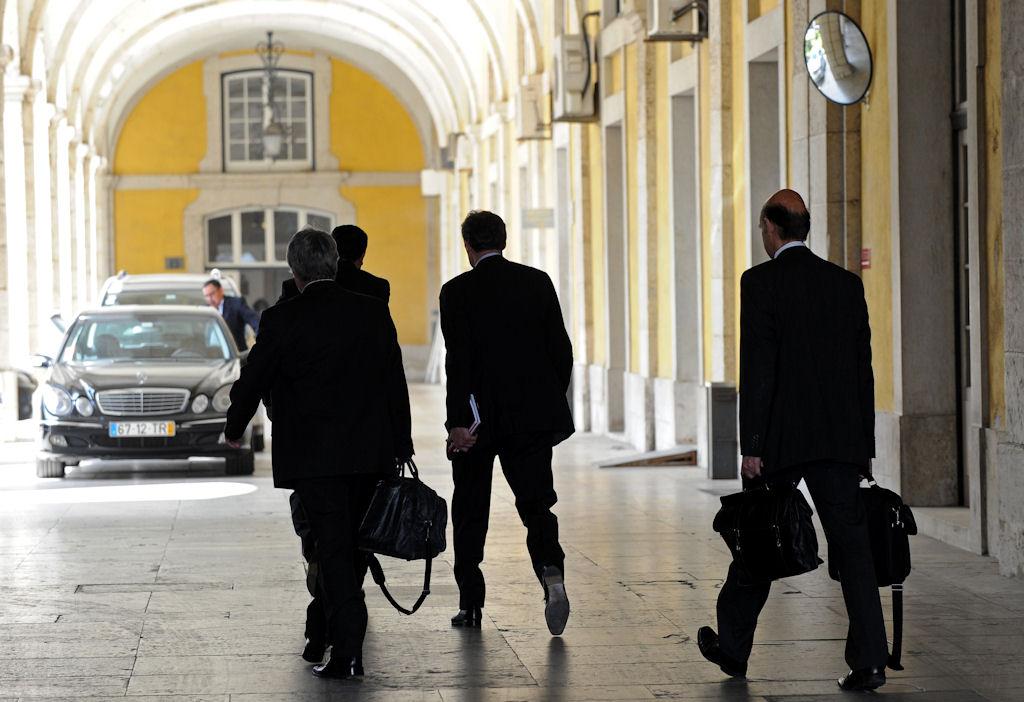Portugal’s unique economic mess
Representatives of the International Monetary Fund, the European Union and the European Central Bank leave a meeting with Portuguese Finance Minister Fernando Teixeira dos Santos at the Finance Ministry in Lisbon on April 18, 2011.
LISBON, Portugal — Easter weekend traditionally marks the start of the beach season in Portugal, but as the Portuguese headed for the coast this year they were met by torrential downpours and wintry temperatures.
For some wags, there was no doubt who was to blame for this latest national affliction. “The IMF called up the rain to punish us all for taking a holiday,” was a none-too-original comment posted on one economic news website.
The chill winds spoiling the holidays blew into Portugal at the same time as the dreaded “men in black” from the International Monetary Fund and European Union. Their task is to evaluate just how tough an austerity program the country will have to endure in return for an international bailout package that is expected to total at least 80 million euros ($116 billion).
The weather may be bad, but it's nothing compared to the perfect storm of political chaos and economic gloom gripping a nation that has long been the poorest in western Europe.
Portugal's Socialist government collapsed on March 23 after center-right opposition parties united with the Communist Party and other left-wing groups to defeat a cost-cutting package designed to reduce the country's 9.1 percent budget deficit. Days later Portugal was forced to turn to the EU and IMF for a bailout, the third eurozone nation to do so, following Greece and Ireland.
The country of 10.6 million will vote on June 5 to choose a new government, with the Socialist incumbent Jose Socrates facing off against Pedro Passos Coelho, of the center-right Social Democratic Party.
Bitterness between the two parties is running high in the aftermath of the government collapse and bailout plea, but the negotiators from the IMF and EU are trying to get both to agree on belt-tightening measures that will persuade critical creditors in northern Europe that Portugal deserves to be rescued.
The two may well be condemned to work together. The latest opinion polls have them almost neck-and-neck, but with neither able to form a working majority in parliament.
The balance of power is likely to be held by far-left parties who oppose the bailout and refused even to meet with the IMF and EU negotiators. They say Portugal should raise money by massive hikes in taxes.
Coalitions with the leftists look impossible, so Socrates and Passos Coelho will likely have to find someway of working together after the election.
Whoever wins will not have a free hand in deciding economic policy for the foreseeable future, given that fiscal measures will need to be drawn up in conjunction with the creditors from the IMF and EU.
That means the new government will be unlikely to have the leeway to make generous gestures like Socrates' decision to allow government workers to take a half-a-day on Thursday ahead of the four-day official Easter break. The decision annoyed the international assessment team, which worked through the holiday given the urgency of Portugal's situation.
“We are giving the image of a country that doesn't want to face up to reality, that apparently we don't need to work,” Estela Barbot, a Portuguese member of the IMF's Europe Advisory Group told Lisbon's TSF radio. “The country's image is very important and, if we all know the mess we are in, we should be showing that we are doing what we have to to get out, not doing the exact opposite.”
Conversations with ordinary people show the level of concern over the state of the economy: a real estate agent complains that she can't sell because banks won't lend to home buyers; a rural leather worker says he's unable to compete with Chinese copies of traditional handicrafts; an IT student is looking for work in Brazil or Angola as Portugal's unemployment climbs to a record 11 percent.
Unlike Greece, Ireland or neighboring Spain, Portugal did not enjoy a boom in the early 2000s before the global financial meltdown of 2008 knocked it into recession. Portugal wasn't invited to the fiesta, but got to share in the hangover. From 2001-2005 the Portuguese economy expanded on average just 0.8 percent per year. Over the same period, Ireland grew 5.5 percent, Greece 4 percent and Spain 3.6 percent.
Too dependent on low-wage, low-skill industries, Portugal struggled to compete with new EU members in eastern Europe and the growth of Chinese and Indian exports.
Portugal was just beginning to pull out of its own localized doldrums when the global financial meltdown snuffed out the recovery.
Seeking to bring down the deficit to 4.6 percent this year and head off the need for a bailout, Socrates' government had already imposed a 5 percent cut in civil service wages, frozen pensions and hiked sales taxes.
The Portuguese are resigned now to more lean years imposed by the IMF and EU regardless of the government they elect in June. Portugal's economy is forecast to grow on average just 0.4 percent over the next five years — one of the lowest rates in the world, according to IMF predictions.
Every day, reporters and producers at The World are hard at work bringing you human-centered news from across the globe. But we can’t do it without you. We need your support to ensure we can continue this work for another year.
Make a gift today, and you’ll help us unlock a matching gift of $67,000!
